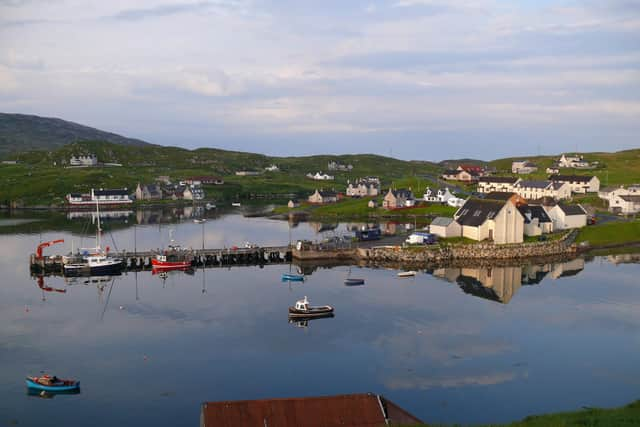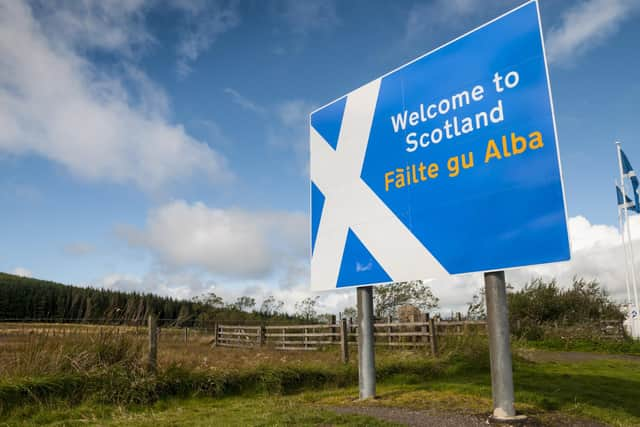'Death blow' to Gaelic's survival as Scottish Government cuts funding
A 'death blow' has been served to the survival of Gaelic as a living language as hundreds of thousands of pounds are cut from budgets set aside to protect and promote it.
The Scottish Government is will reportedly cut £354,000 from Bòrd na Gàidhlig this year with MG Alba, which funds programme making for BBC Alba and other Gaelic platforms, having “huge concern" over its budget settlement, given its £13m annual funding had lost 50 per cent of value over the past decade.
Advertisement
Hide AdAdvertisement
Hide AdThe cuts at Bòrd na Gàidhlig have been heavily criticised by Gaelic campaigners given much of the money was used to fund Gaelic development officers to strengthen the language at community level.


The cuts come four years after academics warned of a ‘Gaelic crisis’ in the vernacular communities, chiefly found in the Western Isles, Skye and Tiree, with forecasts the language would die out within 10 years if policy was not realigned into the heartlands.
Martainn Mac A’Bhaillidh, leader of the Gaelic campaign group Misneachd, condemned the cuts to community development work in light of the 2020 forecasts.
He said: “Essentially this is a death blow to Gaelic as a living language as spoken in the communities.


“We understand there are pressures but if we are in any way serious about maintaining Gaelic as part of Scotland’s cultural heritage, it is now or never. This is not something we can say ‘we can cut this just now and maybe in a couple of years we can look at it’ – it is life or death. The language is on its death bed."
He added: “It is this SNP government that needs to do something about it. It is going to be on their heads if this is going to be the last time that you see Gaelic as a spoken vernacular in Scotland.”
When the Gaelic Officer fund opened in 2022, the original budget of £250,000 was doubled given demand with development officers created across the islands as well as in Edinburgh and Argyll. Now, the future of at least 21 positions looks uncertain.


The core budget of Bòrd na Gàidhlig will stay roughly the same at around £5.1m, it is understood, once the funding stream for development officers has been removed.
Advertisement
Hide AdAdvertisement
Hide AdA Scottish Government spokesperson said: “Over the past three financial years, the Scottish Government was able to identify additional short-term funding for Bòrd na Gàidhlig to allow it to expand the development officer network promoting Gaelic in bodies and projects. Despite the extraordinary financial challenges facing the Scottish Government, Bòrd na Gàidhlig’s core baseline funding has been protected. However, the additional short-term funding will not be able to continue.
“The Scottish Government recognises the significant part Gaelic plays in Scotland’s culture and we want to support the language to thrive and grow, which is why we are bringing forward the Scottish Languages Bill to provide further protection for Scotland’s indigenous languages.”
John Morrison, chair of MG ALBA, said its £13m budget from the Scottish Government had lost significant value and been effectively “frozen" for a decade.


He said: “Gaelic has enjoyed widespread public and political support over many years which has helped the language make a very significant contribution to cultural life.
“Investment in Gaelic is just that - an investment. From our own perspective at MG ALBA, for every £1 of investment, we have generated a return of £1.34 and created more than 340 jobs – nearly 200 of them in the Highlands and the Western Isles.
“So, funding for MG ALBA is not a handout. Our annual budget of £13 million from the Scottish Government has been effectively frozen for 10 years which means that very soon its value will be diminished by 50% since the launch of BBC ALBA. Anything that reduces the development of talent, skills and the Gaelic language, especially amongst young people, is of huge concern.”
Around 58,000 people across Scotland speak Gaelic - around 1.1% of the population - with the language classed as “definitely endangered” by UNESCO.
The loss of funding comes as a new Scottish Language Bill, which aims to give official status to Scots and Gaelic and reinforce their use in education and public life, is in its early stages in parliament.
Advertisement
Hide AdAdvertisement
Hide AdThe bill also proposes the creation of “areas of linguistic significance” that will attract further support to sustain use of Gaelic and increase opportunities for learning while linking these to social and economic issues.
Local authorities can apply for designation if at least 20 per cent of the area’s population has Gaelic language skills, the area has a historical connection with Gaelic or the area hosts Gaelic education other significant Gaelic activity.
Professor Conchúr Ó Giollagáin, of the Language Sciences Institute at the University of Highlands and Islands, a co-author of the Gaelic Crisis in the Vernacular Communities in 2020, said the the bill, while in its early stages, “lacked vision" and was not focused enough on sustaining the language in its heartlands.
Last night, he said his 2020 prediction still stands that the language would die out in Gaelic-speaking communities within 10 years given the absence of any fundamental changes to policy.
He said, while the Scottish Languages Bill was in its early stages, the proposed legislation “lacked vision” and did little to address the crisis.
The creation of the “areas of linguistic significance” was an idea borrowed from Wales, where issues facing the Welsh language are less acute than those facing Scottish Gaelic, he added.
Of the criteria for the new areas, he added: “These are all very laudable but you could argue that covers all of Scotland probably with the exception of Orkney and Shetland.
“The social geography of Gaelic, according to the Bill, is nearly all of the landmass of Scotland, except for the Northern Isles
Advertisement
Hide AdAdvertisement
Hide Ad“The approach now is to be national and we are not sure how the vernacular crisis is going to be prioritised.
“If you want to give a minority language national status it is important in this new legislation to demonstrate how it is going to be relevant to a broad spectrum of the population.
“But I think it is reasonable to prioritise effort and resource when the last remaining vernacular communities are on the point of collapse, as we know they are.”
A spokesman for the Scottish Government said it would “continue to engage with stakeholders” as the bill makes its way through the parliamentary process.”
Comments
Want to join the conversation? Please or to comment on this article.